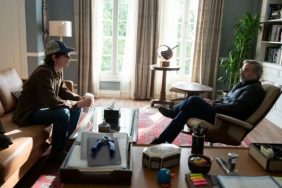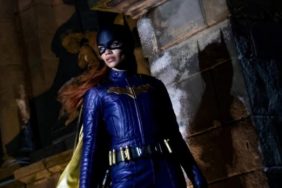Jon Bernthal has made a career out of looking tough, but being vulnerable. The actor’s most memorable roles have often by intimidating men of action who, when you look past the macho façade, are clearly in genuine pain. Shane Walsh in The Walking Dead, Grady in the World War II drama Fury, even Frank Castle, the Punisher, in Netflix’s Daredevil and the upcoming Punisher series. He’s one of the most empathetic actors we have.
So it’s interesting to see Jon Bernthal in Pilgrimage, a new historical thriller about a group of monks charged with escorting a religious relic across the Irish countryside. Bernthal plays “The Mute,” a character who – true to his name – doesn’t speak a word throughout the movie, but does reveal many secrets about his past through kindly, and eventually violent actions. When the monks are beset by bandits, it falls to The Mute, The Cistercian (Stanley Weber) and The Novice (Tom Holland, Spider-Man himself) to protect the relic at all costs.
I spoke to Jon Bernthal on the phone this morning about the physical and performance challenges of his new role, and how the fast pace of the Netflix superhero shows helped prepare him for the rigors of low-budget action cinema. He also admitted to being “very nervous” about his upcoming solo series, The Punisher, and explained why it’s so very important to him that they do justice to the character of Frank Castle.
Pilgrimage premieres in theaters, on VOD and Digital HD on August 11, 2017.

RLJ Entertainment
Crave: Pilgrimage looks like quite production. It seems like the perfect film to do if you want to be an actor and also get some hiking done.
Jon Bernthal: [Laughs.] Yeah, I mean look, I think there’s some truth to that. The team that made this movie was very smart. They did not have tens of millions of dollars to make this movie, so instead of creating the majestic beauty of western Ireland and these unbelievably remote locations, we sort of just hiked to them, and went into them, and found places that had 360-degree views of area and land that hadn’t been touched in tens of thousands of years.
I thought that was really smart. I think it added to the richness of the movie. It definitely added to the richness of the experience. And I think that we all went to this very remote part of western Ireland, we’re thirty miles from any town, there’s no internet, there’s no phone, there’s no night life or anything around there… we were just there making that movie. When we had time off we hiked up a mountain. When we were shooting, we hiked up a mountain. I think that it added to the camaraderie and the closeness of the group, and I’m really grateful for the experience.
What were you carrying that whole time? They’ve got you carrying one of those big wooden things. Was that extra hard for you or was it full of something soft to make it easy?
No, I asked for it to be weighted down. It wasn’t terrible by any means, but it was an interesting way to carry something. I was happy for it. I think it added to the nature of the character. I wanted there to be something sort of animalistic and simple to him, especially at the beginning part of the movie. You know, unassuming. And I wanted him to be looked at, especially among the other travelers, as an animal that was there to help them.
Your character doesn’t speak throughout the movie. Was that part of the appeal to you? Did that force you to work outside your comfort zone?
Yeah, it was. I mean look, when I first read the script, Jamie Hannigan’s script really blew me away. There was many different languages used in the script. I was the only American in the movie. When I read it there’s French and there’s Gallic and there’s English, and there’s all this different use of language in the film. There’s Latin. And I thought that would be interesting, to create another language, this language of a mute, this guy doesn’t talk but clearly had a voice and clearly has wants and feelings and reactions. I thought the opportunity to create that was a unique one, and it scared me, and precisely why I went after it.

RLJ Entertainment
Why did it scare you? Were you concerned about losing so much of your instrument?
No, it scared me just because it was different. It’s difficult. It’s something that I hadn’t done before. I think that I’m a physical actor. I like doing things full force and going big, and I think this, you know, taking away your voice requires a different skill set than I’m used to. I normally play… I’ve come off of a string, you know? Shane Walsh [from The Walking Dead] and Brax from The Accountant, there are very verbal characters, you know? Guys who really talk a lot. And taking that away is a unique challenge. Trying to be as cogent as possible with your expressions and what the character’s going through, but not being able to reveal anything through dialogue, I think offers a unique challenge.
That’s interesting to me because from my perspective, as an audience member, you tell so many stories just with your eyes. You’ve played so many “tough guy” characters in things like Daredevil and Fury, and every time I look at that guy I say “That guy has been through a lot. That poor bastard.”
[Laughs.]
What do you do? Do you practice in front of a mirror? How do you convey that much with so little?
Each job’s different. For me it’s not so much in front of a mirror, it’s just I’m trying to create as rich and as deep a backstory, and play with my imagination, as much as possible. And take things from my own life and I think that, for me, the more clear your character’s history is, the easier it is to access it when the cameras are rolling, and the easier it is to actually be in it.
I think with a character like this we really got to time travel. Jamie gave me some great pieces of historical fiction. Being isolated the way that we were really made it so there weren’t a lot of outside distractions. And I was able to really create this pretty clear, pretty specific history for my character. And having that secret, and having those memories, and having that frame of reference, and not necessarily having… there’s no need or desire to share that with the audience, I can keep it completely mine, I think is interesting.
I think having a lot going on and only revealing a little bit is always better than pouring it all out, and I dig that. I dig roles like that, as a character. I dig the art of suppression. I think that it’s very human.
It gets complicated, though, when you’re doing television, because you never know what the next big revelation is going to be, right?
Yeah, I think so, but you can only deal with what you have at hand. I think that there’s all sorts of complications in doing television and not knowing your beginning, middle and end. But I feel that, like in this movie, I think the time restraints and the pace of television, and how fast you need to move, also really mirrors life in a much more realistic way than film does. You don’t have time to think most of the time in life, and you don’t have time to plan, and you’ve got to be willing to change in the moment and be adaptable and fly by the seat of your pants.
You know, in a film like this we had these fight scenes. If this was a big studio movie that we had tens of million of dollars for, we would have taken weeks to shoot those fight scenes. We had to shoot, each one of the fight scenes in this movie, we shot in a half-day. And what that requires is an unbelievable amount of preparation. No stunt doubles. We had to learn that fight inside and out. But then on the day you still fight. You don’t have time to make sure you’ve got it. You don’t have time to be safe. You don’t have time to go back and do it again. And if something goes wrong you’ve just got to cut it and move on.
[Like] fighting in real life, or like any sort of big action sequence, I think having the stakes being that high really creates another layer to the scene and makes it more rich and more dangerous and more vital. I like that. I think a lot of people get frustrated by those types of things, but I’ve got a lot of practice with tv. I like having my back against the wall in an action scene.

Netflix
Is that what it’s like on the Netflix shows? They look really expensive but I imagine the pace must be intense.
Intense, man. Yeah. The prison fight in season two of Daredevil, we did that in one half-day. We did that after lunch. We tried to get in one or two takes, and what that requires is getting in that prison and practicing the hell out of it in the little bit of time off that you have, and again, it’s not for everybody. Some people really don’t like working that way. In the moment sometimes I get frustrated by it, but looking at it in retrospect I enjoyed that. I enjoyed having to get it. I enjoyed trying to get it once in sort of a dangerous and dirty way. Sometimes you get hit, sometimes you get bumped, but I’d rather do it like that than do it a hundred times and lose that sense of danger, and lose that sense of anything can happen here. I think that that sort of color really affects the scene on the screen.
How excited are you to show the world your own superhero tv series, coming up? We all love The Punisher and want to see more of him.
How do I feel about it?
Yeah, it’s got to be exciting, right…?
Yeah, I mean look, man, I’m nervous. You know? I’m very nervous. I care a lot about Frank. I care a lot about this character. I think that this character resonates with the law enforcement community, resonates deeply with the military community. That’s something I care a ton about. The comic book audience is an audience that I respect and revere, and I want to do want to do right for them and by them with this character. It’s a big responsibility and I just want it to be good. I just want it to work. And I fight like hell when we’re making that show to try to make it a certain way, and I hope that the fighting pays off.
Top Photo: Monica Schipper/FilmMagic
William Bibbiani (everyone calls him ‘Bibbs’) is Crave’s film content editor and critic. You can hear him every week on Canceled Too Soon and watch him on the weekly YouTube series What the Flick. Follow his rantings on Twitter at @WilliamBibbiani.






